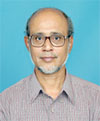Dr. Partha Pratim Majumder , Director
of the National
Institute of Biomedical Genomics, Kalyani (near Kolkata) and Head for
Human Genetics, Indian Statistical Institute, Kolkata gave a talk titled
"Our Footprints on the Sands of Time" on 12th April 2010 .

About the speaker:
Dr. Partha Pratim Majumder is the Director of the National Institute of Biomedical Genomics, Kalyani (near Kolkata). He is also a Professor at the Indian Statistical Institute and the Indian Institute of Science Education & Research, Kolkata. He obtained his Bachelor’s, Master’s and Doctoral degrees from the Indian Statistical Institute. He did his post-doctoral research at the Center for Demographic & Population Genetics, University of Texas Medical Center, Houston. He has served on the faculty of the Department of Biostatistics and Human Genetics of the University of Pittsburgh. His major scientific interests and contributions have been in the field of human population genetics and genetics of complex human disorders. He is an elected Fellow of all the three science academies of India. He has served on the Board of Directors of the International Genetic Epidemiology Society (IGES), and was the founding Chair of the ELSI Committee of IGES. He is a Member of the Human Genome Organisation. He is a recipient of many awards and medals, including the TWAS (The Academy of Sciences for the Developing World) Biology Prize – 2009, G.D. Birla Award for Scientific Research – 2002, Shri Om Prakash Bhasin Award in Biotechnology – 2001, Ranbaxy Research Award in Applied Medical Sciences – 2000, and the New Millennium Science Medal, Government of India, 2000.
Our Footprints on the Sands of Time
With the advent of Human Evolutionary Genetics scientists
have been trying to answer questions that have intrigued human psyches
for long. When did life begin on earth? Who are we? Where did we come
from? Are we all related to each other? There are several historic and
religious interpretations to these questions but whether these interpretations
are scientifically accurate need to be known. To provide a scientific
insight into these mysteries, IIT Kanpur invited Dr. Partha Pratim Mazumder,
a renowned human geneticist and Head of Human Genetics Unit at Indian
Statistical Institute, Kolkata.
On 12th April was his first lecture titled "Our Footprints on the
Sands of Time". The lecture was divided into two parts. The first
part traced the evolution of life from 5 million years ago (mya) till
150, 000 yrs ago while the second part covered the evolutionary changes
in life that took place 150,000 yrs ago and are continuing till date.
The evolution began about 5-6 mya when a population of African apes split
into two distinct species - one leading to the emergence of modern humans
and other to modern chimpanzees. The genus Homo is said to have evolved
2 mya in Africa (fossil remains dated to about 1.9 mya traced in Africa).
Modern humans who are less heavily built and more mobile appear to have
emerged around 130,000 yrs ago. We humans fall under the category of Homo
sapiens sapiens. Dr. Mazumder shared different models of human evolution
and later provided genetic evidence in support of Out-of-Africa model
(model that suggests that humans evolved in Africa and from Africa they
spread across different continents). The two proposed routes via which
modern humans made advances Out-of-Africa were northern exit route and
southern exit route. However, the genetic evidence supports the migration
through the northern exit route.
Later, he showcased certain slides which contained data regarding the
ethnic composition of India. There are about 450 tribes, 4000 caste based
communities and about 150 religious groups. It posits that India is a
country with enormous genetic and cultural diversity. Human geneticists
and anthropologists have tried to establish the evolution of Indians using
the information stored in human genome. As per the genetic evidence, major
expansion of modern humans took place within India.
Based on the study and analysis of DNA and mtDNA Dr. Mazumder inferred
that there was relatively small number of founding females in India. Ethnic
diffusion took place gradually due to cultural or demic diffusions. He
spoke in detail about the two diffusion types and their implications.
Isn't it fascinating that a small DNA thread contains links to human evolution,
genetic diversity and ethnic complexities. He ended his talk by quoting
few lines from Maya Angelou's book "Wouldn't Take Nothing from My
Journey Now" which read that everyone should respect diversity as
in diversity there is beauty and there is strength.